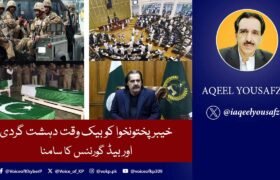Shahzad Masood Roomi
Economy growth and fiscal management has remained the biggest governance challenge for multiple successive regimes in Pakistan due to issue of inconsistent and often conflicting economic policies pursued by different regimes. This lack of a collective national economic vision has caused Pakistan dearly and now country is on the brink while inflation, supply control, and tax reforms all are in tatters.
Economic experts, both local and international, have been pointing out the structural problems due to which foreign investors have remained uninterested in investing in Pakistan to provide much needed boost of foreign exchange influx. CPEC began some 10 years ago, though multiple projects have been completed, yet it hasn’t contributed to Pakistan’s economic revival as was expected due to lack of investment from investors other than Chinese. Security was perhaps the biggest concern. Now Pakistan, under the joint vision of civil-military leadership has formed an “Economic Revival Plan”.
As per government announcement this is going to larger than CPEC, to address the nation’s continued struggles with growth.
While CPEC was focused on geo economic potential of the country, this new plan is focused on harnessing the country’s untapped potential in key sectors through local development and foreign investments mainly from “gulf countries” and expediting project implementation.
To boost the investor confidence and ensure the continuation of policies, the federal government has established a ‘Special Investment Facilitation Council (SIFC)’ that will act as one window operation center to streamline which will serve as a streamlined interface for investors by removing all sorts of legal and operational hurdles in investments with the help of the army.
The plan was unveiled during an event by former Prime Minister Shehbaz Sharif and attended by the Chief of Army Staff (COAS) Gen Asim Munir, at the Prime Minister House in the presence of entire federal and provincial governments.
COAS has expressed his willingness to take on this challenge of economic revival of Pakistan based on vision of an export-oriented foreign direct investments (FDIs) drive. He expressed that inclusion of Army in formal role in SIFC means it’s now a whole-of-nation effort which will succeed InshaAllah as Pakistan is blessed with countless minerals and other economic potentials.
According to media reports, the proposed economic revival plan envisages tapping Pakistan’s hitherto untapped economic potential in key export oriented sectors like defence production, agricultural, livestock, minerals and mining, information technology and energy, through indigenous development as well as investments from friendly countries.
COAS has taken the ownership of this program by announcing all-out support to complement national efforts as he thinks that for Pakistan to get its rightful place in comity of nation, socio-economic prosperity is the key.
Strategic goal of economic revival plan is to make Pakistan a trillion dollar economy by 2030. In order to achieve that, SIFC will play its role in by streamlining investments both local and foreign. The biggest hurdle to streamline business setup in Pakistan emerged after 17th amendments where powers and control over business setup were divided among the center and provinces. SIFC will also sort out such hurdles. The aim is to avoid duplication of laws, taxes, and regulations at federal and provincial levels.
SIFC will promote the concepts of “one government” and “collective government” to remove all barriers to investment and business activities. As far as the investment origin target is concern, SIFC will focus on attracting investments from Gulf states particularly close allies like Saudi Arabia and UAW. In this regard, a meeting with Saudi investors has taken place already. Main role of Pakistan Army in SIFC will of coordination among various departments and ministries in the government both at federal and provincial levels.
As for socio-economic impact of economic revival plan, investment under this plan will provide employment to more than 1.5 million people directly and with expanding business and industrial clusters in various sectors approximately 75 to 100 million people will benefit indirectly.
As per COAS vision, Pakistan has potential to become an export hub in global market. SIFC envisages to get 100 billion USD FDI by 2030 while boosting Pakistan’s exports to $70 billion. Not only have that, SIFC also wanted to create local industrial ecosystem with aim of “import substitution” of equal amount in the next four to five years. Once achieved, this output performance will contribute tremendously in increasing Pakistan’s net foreign reserves.
Without any doubt, these are very ambitious project goals but with right mindset, vision and political backing, nothing is out of reach.
Pakistan Army will be coordinating efforts by various government departments to for working framework which will be followed in future consistency, and it will help government to formulate policies to attract FDI where security, economic and management measures will be controlled by a single authority under SIFC. It will certainly enhance foreign investors’ confidence.
Pakistanis deserved nothing less from those who had been bestowed the responsibility to administer the country by Almighty Allah and the people of Pakistan. In Sha Allah under the able leadership of COAS General Syed Asim Munir Shah, Pakistan will find its lost path to glory, and he will be remembered as nation’s savior!




